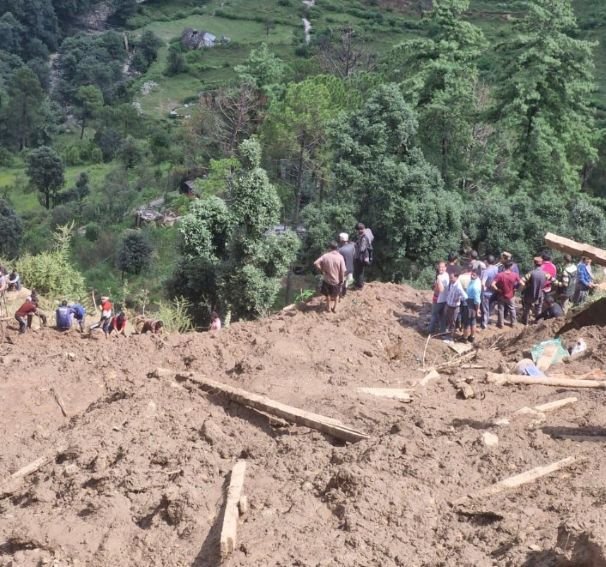Himachal Pradesh is still grappling with the devastating aftermath of heavy rains and landslides that have disrupted lives, destroyed homes, and left communities struggling to come to terms with the scale of the tragedy. Amid this backdrop, the recent controversy surrounding the proposed foreign tour of Health Minister Colonel Dhani Ram Shandil and a ten-member team of the state health department has once again highlighted the need for governments to reflect on their priorities during times of crisis.

The minister’s planned foreign visit, reportedly at government expense, included his son as a part of the delegation. This immediately sparked a storm of criticism on social media, where people questioned both the timing and the intent of such a tour. With thousands of families still waiting for relief and rehabilitation in rain-affected regions, the idea of a high-profile foreign study tour appeared deeply insensitive to public sentiment. Facing growing backlash, the minister has now postponed the visit for six months, clarifying that he and his team will travel only when the situation normalizes.
The Minister’s Stand
Colonel Shandil defended the purpose of the trip, stating that it was aimed at studying advanced health practices abroad and applying them in Himachal Pradesh to improve healthcare delivery. He also clarified that his son and daughter-in-law could accompany him on their own expenses and that this was not an official privilege. While acknowledging the criticism, the minister stopped short of admitting any misjudgment, instead suggesting that journalists should focus on pressing public issues rather than what he termed as “personal matters.”
However, the fact remains that at a time when health infrastructure in many districts is strained due to monsoon disasters, any foreign tour by senior officials—even with a genuine intent of learning—sends the wrong signal.
Public Anger Reflects Real Concerns
The anger on social media is not simply about the minister’s family accompanying him; it stems from the wider perception that the state’s leadership is disconnected from the ground reality. Villages remain cut off due to damaged roads, families are living in temporary shelters, and compensation has been slow to reach those who have lost homes, land, and loved ones. The demand from citizens is clear: all available resources should be channeled into relief and rehabilitation, not overseas trips.
Moreover, reports that other government departments are also planning foreign study tours have added fuel to the fire. At a time when ordinary citizens are struggling to rebuild their lives brick by brick, such news only deepens the sense of alienation between people and their elected representatives.
A Test of Sensitivity and Leadership
Governance, especially in times of crisis, is not only about administrative efficiency but also about emotional intelligence and sensitivity. The postponement of the health department’s tour should ideally become a precedent for other departments. The government must set an example by curtailing non-essential expenses and ensuring every rupee is used for relief, reconstruction, and rebuilding public trust.
This moment calls for solidarity. It is an opportunity for the political leadership to walk hand in hand with citizens, visit the worst-affected areas, engage in dialogue with the people, and offer both immediate relief and long-term reassurance. Such gestures, though symbolic, carry immense weight in restoring public faith in governance.
The Bigger Question: Need for Prioritization
Foreign exposure tours are not inherently bad. Learning from global best practices can strengthen policy frameworks and bring innovation to governance. However, timing is everything. When disaster-stricken families are still struggling to secure food, shelter, and healthcare, any official foreign visit risks appearing tone-deaf. This is where political leadership must exercise wisdom and empathy, prioritizing human needs above administrative protocols.
The idea of “curtailing expenses and coming together” is not merely rhetoric—it is a necessity. Relief operations require significant financial outlays. Roads, bridges, schools, and hospitals need urgent repair. Farmers whose crops were washed away must be supported, and students whose education has been disrupted must be given special attention. Every department has a role to play in this recovery, and diverting funds toward foreign tours at such a time would be indefensible.
A Way Forward
The hope among citizens is that not only the health ministry but also other government departments reconsider their proposed international visits and stand united with the people until the state fully recovers. This is also a chance for the government to introduce a transparent policy on foreign study tours—ensuring they happen only when essential, with clearly defined objectives, and with maximum public benefit.
Colonel Shandil’s decision to defer the tour, even if compelled by public pressure, is a step in the right direction. But true leadership will be tested in the months to come, as the state battles the dual challenges of natural recovery and rebuilding public confidence in governance.
In the end, the message is clear: governments must rise above optics and align their actions with the lived realities of their people. In times of crisis, nothing matters more than empathy, accountability, and standing shoulder to shoulder with those in pain.



